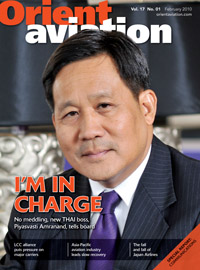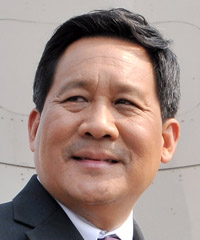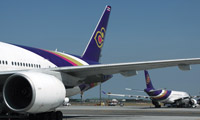News Backgrounder
June 1st 2012
I’m NOT in charge
After cleaning up a carrier noted for its corruption and cronyism, and returning it to profit, THAI president, Piyasvasti Amranand, was sacked last month. Now he may take his board to court to restore his reputation. Read More »
 |
| The cover of Orient Aviation in February 2010 |
For Thai Airways International (THAI) president and chief executive, Piyasvasti Amranand, it came like a bolt from the blue. At a board meeting on May 21, attended by 13 of its 15 directors, 12 voted to axe him.
Fifty-nine-year-old Piyasvasti was the 13th board member present and the straight-talking, former energy minister had no doubts why he was so suddenly and surprisingly shown the door. The sacking, he said, was “politically influenced”.
He didn’t stop there. It was possible his firing resulted from investigations into graft at THAI, and his punishment of corrupt staff who might have sought help from some powerful figures, he claimed. The suggestion was they could have been from within government.
Piyasvasti promised legal action if he found the dismissal tarnished his reputation.
“The board has the right to end my employment, but it must explain [the reasons] why clearly to the public,” he said.
“It is a pity. The management will suffer setbacks from now on. That is the board intervening in all management issues, be it oil risk management, procurement or appointing or reshuffling all [staff] positions.”
THAI chairman, Ampon Kittiampon, refuted these suggestions at a press conference. He said that although Piyasvasti had passed a performance evaluation – he had scored a high 86% - he had “communications problems with the board”.
Chokchai Panyayong, executive vice-president for strategies and business development, a 29-year veteran of the carrier, was appointed acting president until a new chief is appointed.
The shock sacking has angered THAI staff and prompted a stinging attack on the chairman from the airline’s union. Jamsri Sukchotirat, president of the THAI labour union, said Piyasvasti had regularly talked to workers about various issues, especially financial performance and profitability.
“I believe the reason for the removal comes from a conflict between the board’s chairman and the president. The board’s chairman has not cared about the company’s staff. He is unreasonable and self-centred,” said Jamsri. The union wrote to Prime Minister, Yingluck Shinawatra, asking for Ampon to be removed as chairman.
 |
| Ousted THAI boss, Piyasvasti Amranand: before he took the job he was advised by a previous president, who was also removed by the board, to have a good lawyer in place |
In a statement, Prime Minister Yingluck denied there had been political interference. “The government has no one in mind for the position. We should let the THAI board nominate the candidate,” she said.
There have been persistent rumours about Piyasvasti’s future since Thailand’s elections last year. He said at the time he intended to finish the job he had started at THAI.
The opposition Pheu Thai party, led by Yingluck Shinawatra, unseated the sitting Democratic Party of then Prime Minister, Abhisit Vejjajiva, who had appointed Piyasvasti to head THAI.
Ampon pointed out that nine members of the board which sacked the chief executive had worked with the previous Democrat-led government.
THAI is no stranger to turbulence. Despite years of profitability, until heavy losses in 2008 and 2009, it had suffered constant management disruption, political interference in its operations and serious internal divisions between civilian managers and powerful former Thai Air Force officers within the company.
Piyasvasti took charge in October 2009 after THAI suffered a shock $646.3 million deficit in 2008 - its first loss in 43 years - and was heading for another loss in 2009. He took the job after three months of tough negotiations with the board in which he demanded full freedom and flexibility. It now appears his independence was too much for the board.
Speaking to Orient Aviation in January 2010, he made clear his views about the root cause of the airline’s problems: “In the last five years, we have seen major intervention by the board of directors at Thai Airways, who were, in effect, managing the company.
“So much so that the airline’s management stopped managing, which led to a decline in the work of the company.”
Following the sacking, Piyasvasti pointed out that he had restored profitability to THAI in two years and managed its costs, including those of fuel, towards a targeted profit this year. Last year was an exception when THAI lost $325.5 million, but the airline faced the same costly issues of high fuel costs and market uncertainty as airlines across the globe, as well as weeks of serious floods.
 |
| Thai Airways International: a track record of corruption and political meddling |
However, THAI did post a first quarter (January-March) net profit of $117 million, compared with just $19.7 million a year earlier. And this was despite a loss of $172.3 million in the fourth quarter of 2011 when the severe flooding badly affected airline operations in Thailand. THAI’s forward fuel hedging strategy had also resulted in income of $29 million in the first quarter.
Piyasvasti also said that in his two years and seven months in office he had organized a huge aircraft acquisition programme to restore the image of an airline which was suffering from operating old aircraft.
“How can an outcome like this be good if I had problems in communication with the board,” he said.
Chairman Ampon said there was no political interference involved in Piyasvasti’s removal. While THAI had posted a profit during the first four months of 2012, said Ampon, the president had “encountered problems” in implementing the board’s policies.
Communications between Piyasvasti and the board were “not unified” while his performance in many areas had not been in line with the direction set by the board, he said.
One issue appears to be that while THAI will make a profit this year it is unlikely to meet the targeted $191.5 million to $223.4 million under the airline’s recovery plan. Most analysts forecast net income will be much lower, somewhere between $38.3 million and $111.7 million.
Ampon said the board bid “a friendly farewell” to Piyasvasti, who had been a “capable” leader, working to keep THAI successfully “‘level” as it survived a financial storm of losses. But he added that THAI needed more action on marketing strategy and human resource development and a president who would work more closely with the board to achieve the profit goals promised to shareholders.
| 'In the last five years, we have seen major intervention by the board of directors at Thai Airways, who were, in effect, managing the company. So much so that the airline’s management stopped managing, which led to a decline in the work of the company' |
| Piyasvasti Amranand speaking to Orient Aviation shortly after his appointment |
“The strategy used in the past has failed to achieve targets. So the company needs a new executive who can realise personnel development and marketing plans,” said Ampon.
Piyasvasti will officially leave this month although he has had no involvement in management since his sacking. He will receive severance pay amounting to six months salary, about $190,000.
Thailand’s finance permanent secretary, Areepong Bhoochaoom – the Finance Ministry owns 51% of THAI – will chair a committee to select a new president, a process expected to take up to three months.